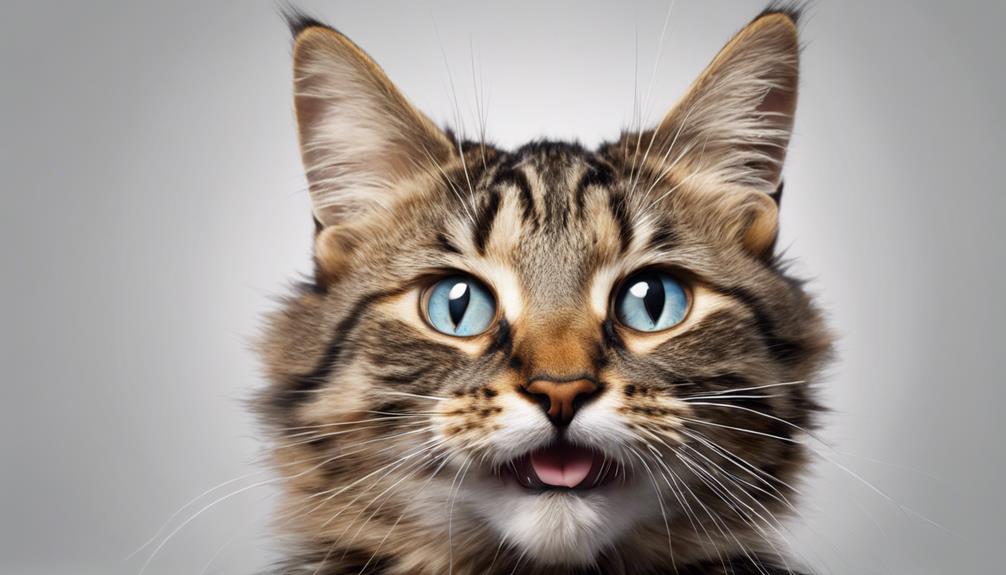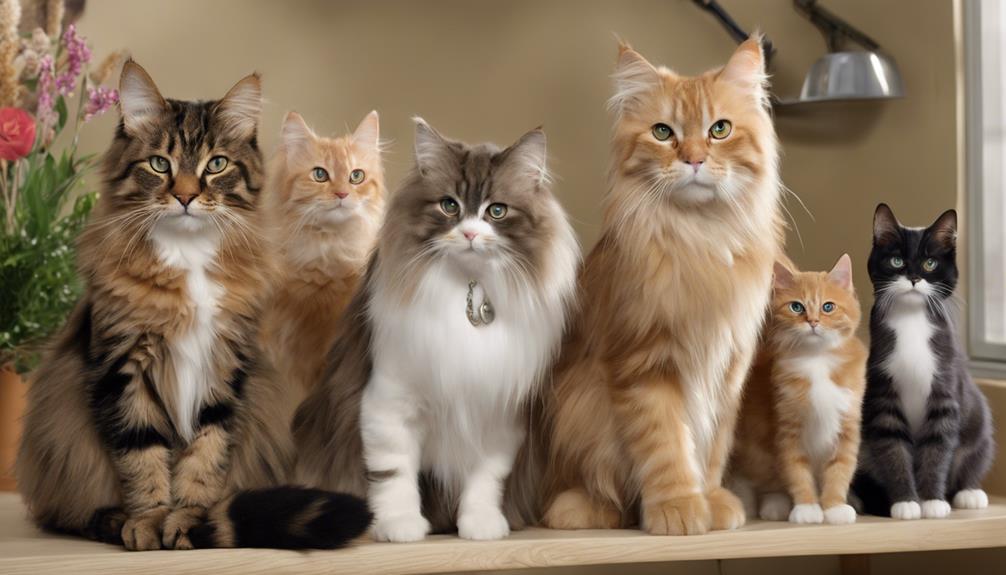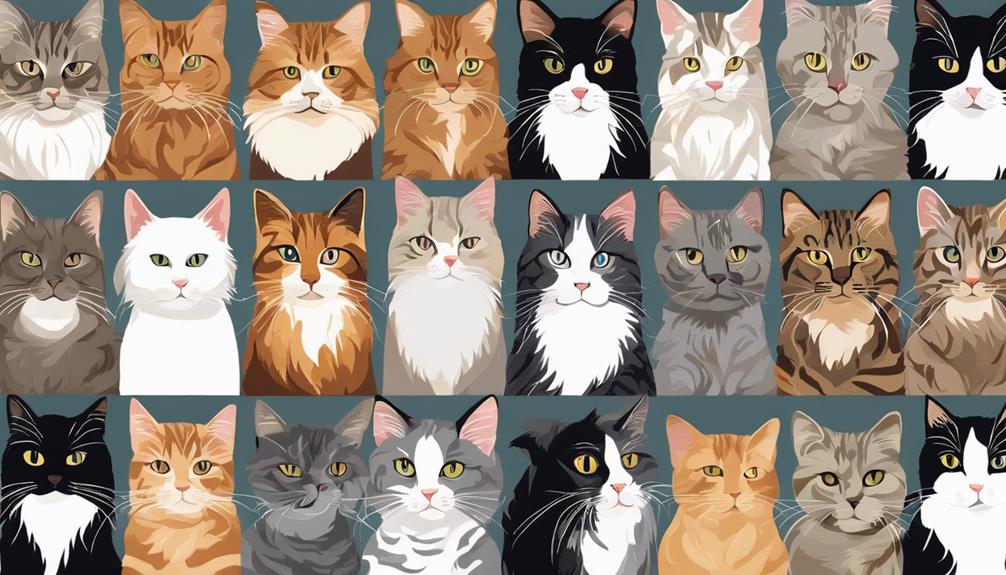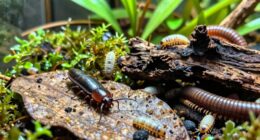Cats can enjoy pears as a **healthy snack**. Pears provide essential nutrients, minerals, and help with hydration. However, it’s important to be careful! Pear seeds contain **cyanide, which is harmful**. Only give them small, seedless pear slices. Look out for any allergies or tummy problems. Cats require a well-rounded diet, so **control is important**. Keep updated on safe fruit choices. Curious about cats and fruit? Delve into the advantages, hazards, and recommendations more. Start now!
Key Takeaways
- Cats can enjoy pears in small, seedless portions.
- Remove all seeds, skin, and stem before feeding pears to cats.
- Monitor for digestive issues or allergic reactions post-pear consumption.
- Only offer fresh, raw pears as an occasional treat in moderation.
- Consult a vet before introducing pears to ensure safety for cats.
Overview of Cats and Pears
When considering the compatibility of cats and pears, it's essential to understand the benefits and considerations of incorporating this fruit into a feline's diet. Cats can indeed eat pears, but it's important to offer them in small pieces.
By cutting fresh, seedless pears into easily digestible portions, we can guarantee that our beloved feline friends can enjoy the vitamins, minerals, and moisture that pear flesh provides. While cats are obligate carnivores, meaning their diet primarily consists of meat, they can still benefit from the nutrients present in pears.
However, moderation is key due to the sugar content in this fruit. Offering pears as an occasional treat can be a delightful way to introduce some variety into your cat's diet while providing them with a healthy snack option. Remember, when it comes to cats and pears, small portions can lead to big smiles.
Nutritional Value of Pears for Cats

Pears offer cats a nutritious combination of vitamins, minerals, and fiber that can positively impact their health and well-being. These fruits are packed with vitamin C, essential for a strong immune system and overall health.
The dietary fiber in pears can work wonders for your feline friend's digestion, promoting gut health and regular bowel movements. Additionally, the moisture content in pears can aid in keeping your cat hydrated, especially helpful for those who may not drink enough water.
Furthermore, the presence of copper in pears supports the immune system and helps in the formation of red blood cells, contributing to your cat's overall well-being. As a low-calorie treat option, pears can provide your cat with essential nutrients in a delicious form.
Risks Associated With Feeding Pears

After discussing the nutritional benefits of pears for cats, it's important to be aware of the potential risks associated with feeding these fruits to our feline companions. When considering whether cats eat pears, it's vital to remember that:
- Pear seeds contain cyanide, which is toxic to cats and can lead to serious health issues if ingested. It's essential to remove the seeds before offering pears to your cat.
- Cats shouldn't consume pear skin, stem, or seeds due to the presence of harmful substances that can be detrimental to their health. Feeding only small amounts of fruit without these parts can help reduce risks.
- Feeding pears to cats in excess can result in digestive problems like diarrhea or stomach upset. It's advisable to introduce new foods gradually and monitor your cat's reaction closely.
Preparation Tips for Feeding Pears
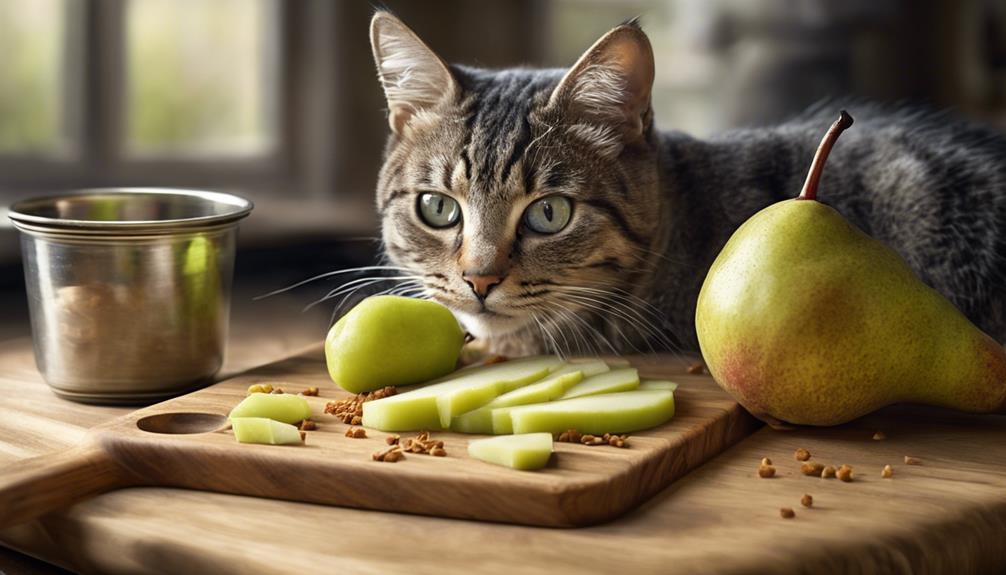
When it comes to feeding pears to cats, it's important to remove the seeds, skin, and stem for safety reasons.
Be sure to cut the pear into small, easily digestible pieces before offering it to your feline friend.
Safe for Cats
For cat owners looking to incorporate pears into their feline's diet, ensuring that the seeds, skin, and stem are removed before feeding is essential for their safety and well-being.
When it comes to feeding pears to cats, here are some important tips to keep in mind:
- Offer pears in small amounts to prevent any digestive issues.
- Always give cats digestible pieces of pears to avoid choking hazards.
- Remember that the seeds, skin, and stem of pears can be toxic to cats, so be sure to remove them before serving.
Serving Size Suggestions
To guarantee the safe consumption of pears by cats, it's essential to cut the fruit into small, digestible pieces before serving. Cats may struggle with larger chunks of pears, so small portions are ideal. Removing the seeds, skin, and stem is vital to prevent any potential harm to your feline friend.
When offering pears, remember they should be an occasional treat, not a regular part of your cat's diet. Stick to fresh, raw, and seedless pears to make sure they're safe for cats to enjoy. Moderation is key here; too much of a good thing can upset your cat's stomach.
Introducing Pears to Cats

Before incorporating pears into your cat's diet, it's crucial to follow specific guidelines to guarantee their safety and well-being.
- Cut the pear into small, seedless pieces: Cats can enjoy pears as long as they're cut into small, manageable chunks without any seeds that could be harmful to them.
- Consult your vet: It's always a good idea to check with your vet before introducing any new food to your cat, especially if they've any health concerns that could be affected by eating pears.
- Offer pears in moderation: While pears are safe for cats in small amounts, it's important to remember that felines should primarily have a diet based on meat. Pears should be seen as an occasional treat rather than a staple in their meals.
When introducing pears to your feline friend, remember to remove the skin, seeds, and stem before offering them this fruity delight. By following these guidelines, you can ensure a safe and enjoyable experience for your cat.
Monitoring Cats After Eating Pears

After cats eat pears, it's important to be vigilant for any signs of digestive issues, like vomiting or diarrhea.
Additionally, watch out for allergic reactions such as itching, swelling, or breathing difficulties.
Keep an eye on changes in appetite or behavior, and if any concerning symptoms arise, consult a vet promptly.
Digestive Issues in Cats
After a cat consumes pears, it's important to monitor them closely for any signs of digestive issues. Here are some key things to watch for:
- Vomiting: Keep an eye out for any instances of vomiting after your cat has eaten pears, as this could indicate a potential issue with digestion.
- Diarrhea: Changes in your cat's litter box habits, particularly diarrhea, may suggest that their stomach is having trouble processing the high sugar content in pears.
- Appetite Changes: Note any differences in your cat's eating habits post-pear consumption. A sudden loss of appetite or excessive hunger could signal digestive discomfort.
Allergic Reactions in Cats
Monitoring cats for allergic reactions after eating pears is important to ensure their well-being and health. Allergies to pears in cats are rare, but it's crucial to watch for symptoms like itching, skin infections, or gastrointestinal issues. If your cat shows signs such as vomiting, diarrhea, or respiratory problems after eating pears, consult a vet promptly.
Look out for persistent itching, redness, or swelling of the skin, which could indicate an allergic response. Keeping a close eye on your feline friend for any unusual behavior or adverse effects post-pear introduction is essential. Remember, your cat's health is a top priority, so stay vigilant and seek professional advice if needed.
Frequency of Offering Pears
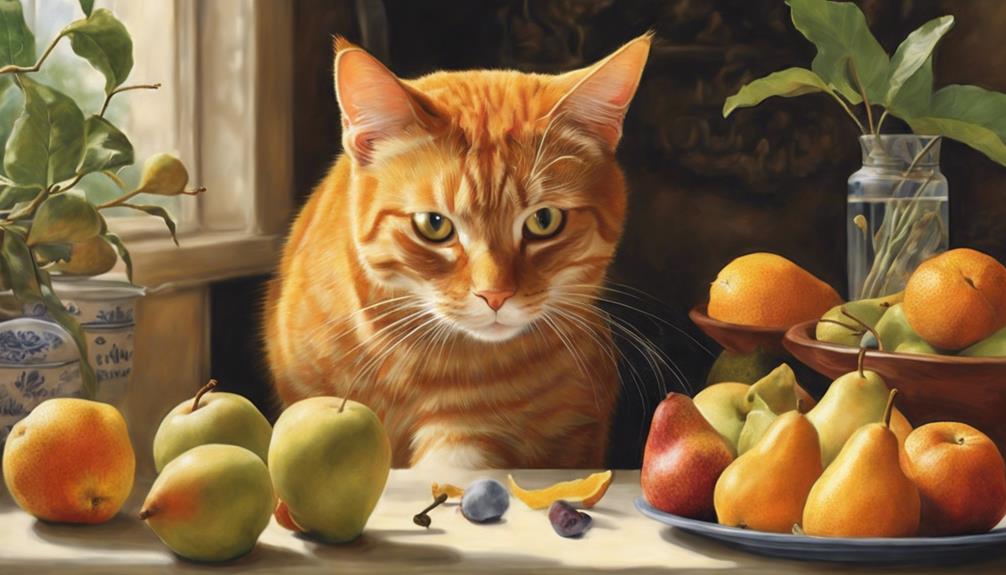
Offering pears to cats should be done in moderation, ensuring they're given only a few times a week to prevent digestive issues and maintain a balanced diet. When feeding pears to your feline friend, remember these key points:
- Occasional Treat: Pears are fruits that contain small amounts of essential nutrients beneficial for cats. However, it's important not to overindulge them in this treat to avoid upsetting their stomachs.
- Balanced Diet: While cats can enjoy the occasional pear slice, their primary diet should consist of high-quality cat food specifically formulated to meet their nutritional needs. Pears should complement their diet, not replace it.
- Health Concerns: Limiting the frequency of offering pears can help prevent potential health issues such as gastrointestinal upset or an imbalance in their diet. Monitoring their intake is vital for their overall well-being.
Alternatives to Pears for Cats

When considering fruits for cats as alternatives to pears, it's important to prioritize their safety and nutritional value. Cats can eat a variety of fruits like apples, bananas, mangos, strawberries, and pineapples, which can be a healthy addition to their diet. These fruits offer a range of vitamins, minerals, and antioxidants that can contribute to a cat's overall well-being. To make sure the fruits are safe for consumption, always remember to remove seeds, skin, and stems before offering them to your feline friend.
Incorporating different fruits into your cat's diet can provide variety and introduce new nutrients. Consulting with a vet before introducing any new fruits is necessary to ensure they're suitable for your cat. By offering a mix of fruits, you can create a balanced and healthy diet for your furry companion. Remember, a happy cat is a healthy cat, so enjoy exploring the tasty and nutritious options that fruits can provide for your feline friend.
Expert Opinion on Cats and Pears

In evaluating the compatibility of cats with pears, experts emphasize the importance of moderation and careful preparation to guarantee feline well-being. When considering if cats can consume pears, it's crucial to note that pears provide essential vitamins and minerals that can benefit your cat's health.
However, to make sure your furry friend stays healthy and safe, here are some expert tips to keep in mind:
- Vitamins and Minerals: Pears offer a source of vitamins and minerals that can complement your cat's diet, but remember, these should only be given in small amounts to avoid any potential digestive issues.
- Cyanogenic Glycosides Concern: The seeds of pears contain cyanogenic glycosides, which are harmful to cats. Always remove the seeds before offering pear flesh to your feline friend.
- Moderation Matters: Due to cats being obligate carnivores, moderation is key when introducing fruits like pears into their diet. Keep portions small and infrequent to prevent any potential digestive upsets.
Digestive Concerns With Pears

To address potential digestive concerns with pears for cats, it is essential to be mindful of the cyanogenic glycosides found in pear seeds. While the flesh of pears is generally safe for our feline friends, the seeds contain compounds that could lead to digestive issues such as upset stomach, vomiting, or diarrhea. Moderation is key when considering giving pears to cats to prevent any discomfort. Additionally, cats may have difficulty digesting the tough skin of pears, which could also contribute to digestive upset.
Let's take a closer look at how pear seeds can affect our cats' digestive system:
| Concerns | Recommendations |
|---|---|
| Cyanogenic glycosides in pear seeds | Avoid feeding pear seeds to cats |
| Upset stomach, vomiting, diarrhea | Monitor cats for any digestive issues after consuming pears |
| Tough pear skin | Peel pears before offering them to cats |
| Moderation is key | Introduce pears slowly and in small amounts |
Toxicity of Pear Seeds for Cats

Pear seeds can be harmful to cats due to the presence of cyanogenic glycosides, which can lead to cyanide poisoning. Symptoms of toxicity include breathing difficulties and neurological issues.
Remember to always remove seeds from pears before sharing this fruit with your feline friend to keep them safe.
Pear Seeds Dangers
Cats should never be exposed to pear seeds due to their potential toxicity from cyanide. When it comes to pear seeds, the dangers for our feline friends are significant. Here's why:
- Cyanide Risk: Pear seeds contain cyanogenic glycosides, which can release cyanide when ingested by cats. This can lead to severe symptoms like difficulty breathing, seizures, and even death.
- Preventive Measure: To keep your cat safe, always remove all seeds from pears before feeding them. Ensuring the pears are seedless is vital to avoid any potential risks associated with cyanide poisoning.
- Toxicity Warning: The toxicity of pear seeds makes them extremely dangerous for cats to consume. Stay vigilant and prioritize your cat's well-being by steering clear of pear seeds.
Safe Pear Consumption
When feeding pears to felines, it's important to make sure removal of all seeds to prevent potential toxicity risks. Pear seeds contain cyanogenic glycosides, which can be harmful to cats if ingested in large amounts. To keep your furry friend safe, be sure to remove all seeds, skin, and stems from the pear slices before offering them a tasty treat.
Cats can enjoy small, digestible portions of fresh, seedless pear flesh as an occasional snack. While cats are primarily carnivores, incorporating a bit of pear into their diet can provide essential nutrients like vitamins and minerals. Remember, moderation and seed removal are key to ensuring a safe and enjoyable pear-eating experience for your beloved feline companion.
Cat-Friendly Fruits Comparison

Comparing various fruits that are safe for cats reveals their nutritional benefits and suitability as occasional treats. When considering cat-friendly fruits, pears stand out for their unique qualities:
- Low in Calories: Pears are a great option for cats looking for a low-calorie treat. Compared to other fruits, pears offer a tasty snack without packing on the pounds.
- Rich in Vitamins: Pears are packed with essential vitamins B6 and C, providing a healthy boost to your feline friend's immune system and overall well-being.
- High in Fructose: While pears are high in fructose, a natural sugar, they can still be a safe and delicious option for cats when given in moderation. The natural sweetness of pears can be a delightful occasional treat for your furry companion without causing harm.
Considering these factors, pears can be a nutritious and enjoyable addition to your cat's diet when fed responsibly.
Behavioral Signs of Pear Allergy

When it comes to cats and pear allergies, it's important to pay attention to their behavior for any signs of discomfort.
Symptoms such as itching, scratching, or gastrointestinal issues might indicate a pear allergy in your feline friend. Understanding these behavioral signs and promptly addressing them can help keep your cat healthy and happy.
Allergic Reactions in Cats
Have you noticed any behavioral changes in your cat that could indicate a possible pear allergy? It's imperative to pay attention to your feline friend's reactions to certain foods like pears. Here are some behavioral signs of pear allergy in cats:
- Itching, Scratching, or Excessive Grooming: Cats may display these behaviors as a response to an allergic reaction to pears.
- Vomiting or Diarrhea: Digestive issues such as vomiting or diarrhea could be indicators of a pear allergy in cats.
- Changes in Appetite: If your cat suddenly loses interest in food or shows a decreased appetite after consuming pears, it might be a sign of an allergic reaction.
If you observe any of these signs, consulting a veterinarian is vital for proper diagnosis and care.
Symptoms of Pear Allergy
Observing your cat for behavioral signs of pear allergy is vital to guaranteeing their health and well-being. Cats with pear allergies may exhibit symptoms like vomiting, diarrhea, or gastrointestinal upset.
Keep an eye out for behavioral cues such as itching, scratching, or excessive grooming, which could indicate a negative reaction to pears.
In severe cases, your cat might experience difficulty breathing or swelling, signaling a serious allergic response. It's essential to closely monitor your cat after feeding them pears to watch for any adverse reactions.
If you suspect your feline friend is allergic to pears, consulting a veterinarian for a proper diagnosis and treatment plan is recommended to address their symptoms and ensure their well-being.
Handling Allergic Cats
To effectively manage allergic cats, it's important to recognize and understand the behavioral signs of pear allergy. Here are some key indicators to watch for:
- Changes in Eating Habits: If your cat suddenly loses interest in their regular cat food after consuming pears, it could be a sign of an allergic reaction.
- Gastrointestinal Distress: Look out for symptoms like vomiting or diarrhea, which may indicate that your cat is having trouble digesting pears or experiencing an allergic response.
- Lethargy or Unusual Behavior: Cats allergic to pears might display lethargy or exhibit behavior changes such as increased agitation or restlessness.
When feeding your cat, always remember that pears contain small amounts of cyanide in their seeds, which can be harmful to pets. If you notice any of these signs, consult your veterinarian for guidance.
Impact of Pears on Cat Health

Pears' impact on cat health is influenced by their nutrient content and potential risks associated with consumption. While pear flesh can offer health benefits to cats, such as essential vitamins, minerals, and moisture, it's important to avoid the seeds.
The cyanide in pear seeds can be harmful to our feline friends, so always opt for seedless pear pieces. Cats, being obligate carnivores, can still derive nutrients from pears when given in small, digestible portions. It's vital to remember that moderation is key.
Excessive sugar content in pears can pose health concerns for cats, so it's best to offer this fruit sparingly. Pears also provide dietary fiber, aiding in digestion, and essential nutrients, benefiting overall well-being.
To make certain your cat reaps the benefits of pears, offer them raw, fresh, and in small amounts. This way, you can provide a tasty and nutritious treat without compromising your cat's health.
Conclusion: Can Cats Safely Enjoy Pears?

Considering the benefits and risks associated with pears, cats can safely enjoy this fruit in moderation for added nutrients and moisture. While cats are obligate carnivores, incorporating small amounts of pears into their diet can be beneficial. Here are some key points to keep in mind:
- Nutrient Boost: Pears offer essential vitamins and minerals that can complement a cat's diet, contributing to overall health and well-being.
- Hydration Support: The moisture content in pears can help keep cats hydrated, especially for those who may not drink enough water throughout the day.
- Moderation is Key: To prevent any potential digestive issues or health concerns, it's important to feed cats fresh, seedless pears in small, digestible pieces. Excessive consumption should be avoided due to the natural sugar content in pears.
Frequently Asked Questions
Is It Okay for Cats to Eat Pears?
Eating pears can be okay for cats in moderation. They provide vitamins and moisture. Remember to remove seeds, skin, and stem to avoid harm. Cut into small, digestible pieces. Treat pears as treats for feline health.
What Fruits Can Cats Not Eat?
Oh, we are aware of which fruits are a big no-no for cats. Cherries, grapes, lemons, grapefruit, and persimmons are off the menu. These can cause serious health issues in our feline friends, so let's steer clear!
Why Do Cats Like Pears?
We can understand why cats like pears. The sweet taste, soft texture, and moisture content are all factors that could appeal to their senses. Some cats may even enjoy batting around a pear for fun.
Can Cats Eat Vegetable Pear?
We believe cats can eat vegetable pears in moderation. These pears are nutritious and safe treats for our feline friends. Remember to peel and deseed them before offering, gradually introducing them and consulting a vet for guidance.
Can Cats Have Fruits in General?
Cats and pineapple interaction is not recommended. While some fruits may be safe for cats to consume in smaller amounts, pineapple could cause digestive issues due to its high sugar content. Cats are obligate carnivores and their digestive systems are not designed to handle fruits, so it is best to avoid offering them to your feline friend.
Conclusion
To sum up, while cats can technically eat pears, it's best to approach with caution. The nutritional benefits may not outweigh the potential risks, such as upset stomachs or allergies. Introduce pears gradually and monitor your cat's response closely.
Remember, every cat is unique, so what works for one may not work for another. When it comes to feeding your feline friend fruits, always prioritize their health and well-being above all else.


